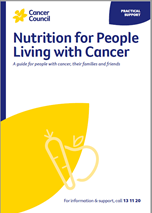- Home
- Ovarian cancer
- Managing side effects
- Bowel changes
Bowel changes
This section is about the impact treatment for ovarian cancer may have on how your bowel works.
Learn more about:
- Overview
- Tips for managing bowel changes
- Treating a blockage in the bowel
- Podcast: Appetite Loss and Nausea
Overview
After surgery or during chemotherapy or radiation therapy, some people notice changes with how their bowel works. You may have diarrhoea, constipation or stomach cramps. Pain medicines may also make you feel constipated. Diarrhoea and constipation can occur for some time, but are usually temporary.
Sometimes tissues in the pelvis stick together after surgery. This is called a pelvic adhesion, and it can be painful and cause ongoing bowel problems such as constipation. In rare cases, it may need further surgery.
To help manage bowel changes, ask your doctor, nurse or dietitian for advice about eating and drinking, and see the tips below.
For more on this, see Nutrition and cancer.
Tips for managing bowel changes
- Drink plenty of liquids to replace fluids lost through diarrhoea or to help soften faeces (poo) if you are constipated. Avoid alcohol, caffeinated drinks and very hot or very cold liquids.
- Avoid fried, spicy or greasy foods, which can cause pain and make diarrhoea and constipation worse.
- Ask your pharmacist or doctor about suitable medicines to relieve symptoms of diarrhoea or constipation.
- Eat small, frequent meals instead of three big ones.
- Drink peppermint or chamomile tea to reduce stomach or wind pain.
- If you have diarrhoea, rest as much as possible – diarrhoea can make you feel very tired.
- If you are constipated, consider taking laxatives and do some gentle exercise, such as walking.
Treating a blockage in the bowel
When food can’t pass through the bowel it can become blocked. This is known as a bowel obstruction. Causes may include surgery or radiation therapy or the cancer coming back. Symptoms may include feeling sick, vomiting, or a swollen and painful stomach. Bowel obstruction can be serious. How it is treated will depend on its cause, where it is in the bowel, and your general health.
Options may include:
Resting the bowel – A bowel obstruction can sometimes be treated by resting the bowel, which means not eating or drinking and having fluid through an intravenous drip until the blockage clears.
Taking medicines – Your doctor may prescribe an anti-inflammatory medicine to reduce the swelling around the obstruction.
Inserting a stent – Surgery may help clear some bowel obstructions. If only one area is blocked, you may have a small tube (stent) put in to help keep the bowel open and relieve symptoms. The stent is inserted through the rectum using a flexible tube called an endoscope.
Creating a stoma – If the bowel is blocked in more than one spot, you may have a stoma. This surgically created opening in the abdomen removes bowel movements from the body. A stoma may be a colostomy (made from the colon in the large bowel) or an ileostomy (made from the ileum in the small bowel). A small bag called a stoma bag or appliance is worn on the outside of the body to collect the waste. The stoma may be reversed when the blockage is cleared, or it may be permanent.
For more information on caring for a stoma, visit the Australian Association of Stomal Therapy Nurses or the Australian Council of Stoma Associations.
→ READ MORE: Managing fluid build-up
Podcast: Appetite Loss and Nausea
Listen to more episodes from our podcast for people affected by cancer
More resources
Dr Nisha Jagasia, Gynaecological Oncologist, Mater Hospital Brisbane, QLD; Sue Hayes, Consumer; Bronwyn Jennings, Gynaecology Oncology Clinical Nurse Consultant, Mater Health, QLD; Dr Andrew Lee, Radiation Oncologist, Canberra Region Cancer Centre and Canberra Hospital, ACT; A/Prof Tarek Meniawy, Medical Oncologist, Sir Charles Gairdner Hospital, WA; Caitriona Nienaber, Cancer Council WA; Jane Power, Consumer; A/Prof Sam Saidi, Senior Staff Specialist, Gynaecological Oncology, Chris O’Brien Lifehouse, NSW.
View the Cancer Council NSW editorial policy.
View all publications or call 13 11 20 for free printed copies.
Need to talk?
Support services
Life after cancer treatment
Webinars, exercise and nutrition, sexuality programs, and back-to-work support
Coping with cancer?
Talk with a health professional or someone who has been there, or find a support group or forum
Cancer Information
Cancer treatment, constipation, diarrhoea and other bowel irritations
General information on managing these issues
Nutrition and cancer help for carers
Tips for preparing food for someone with cancer

